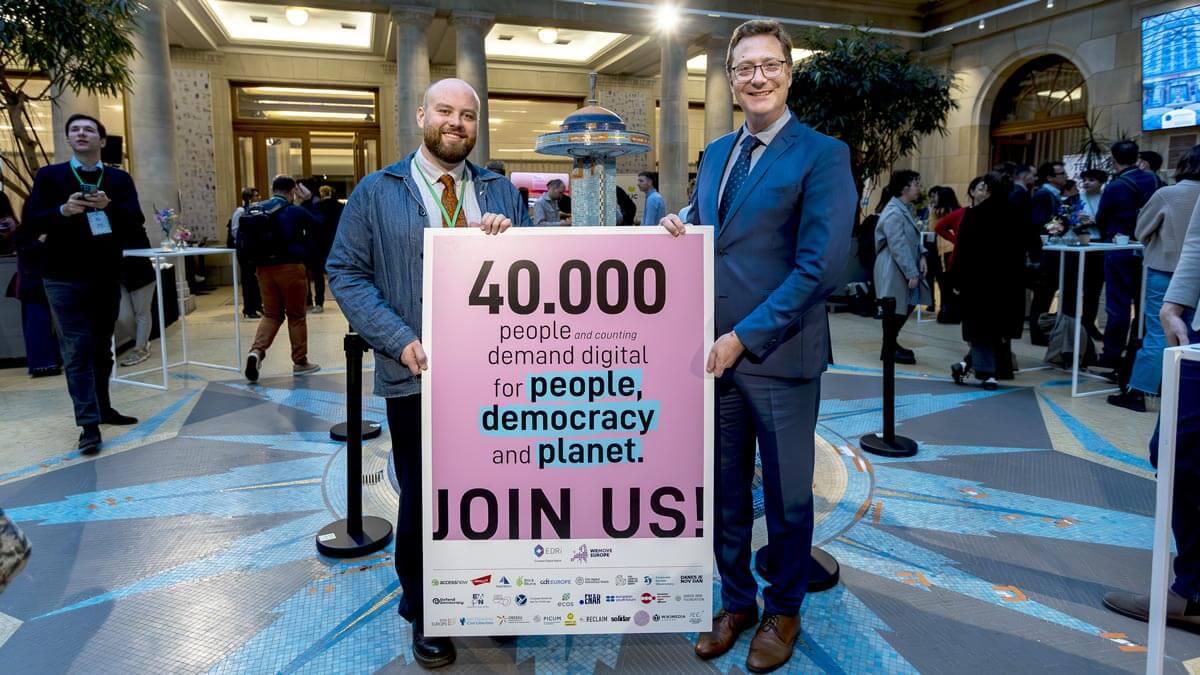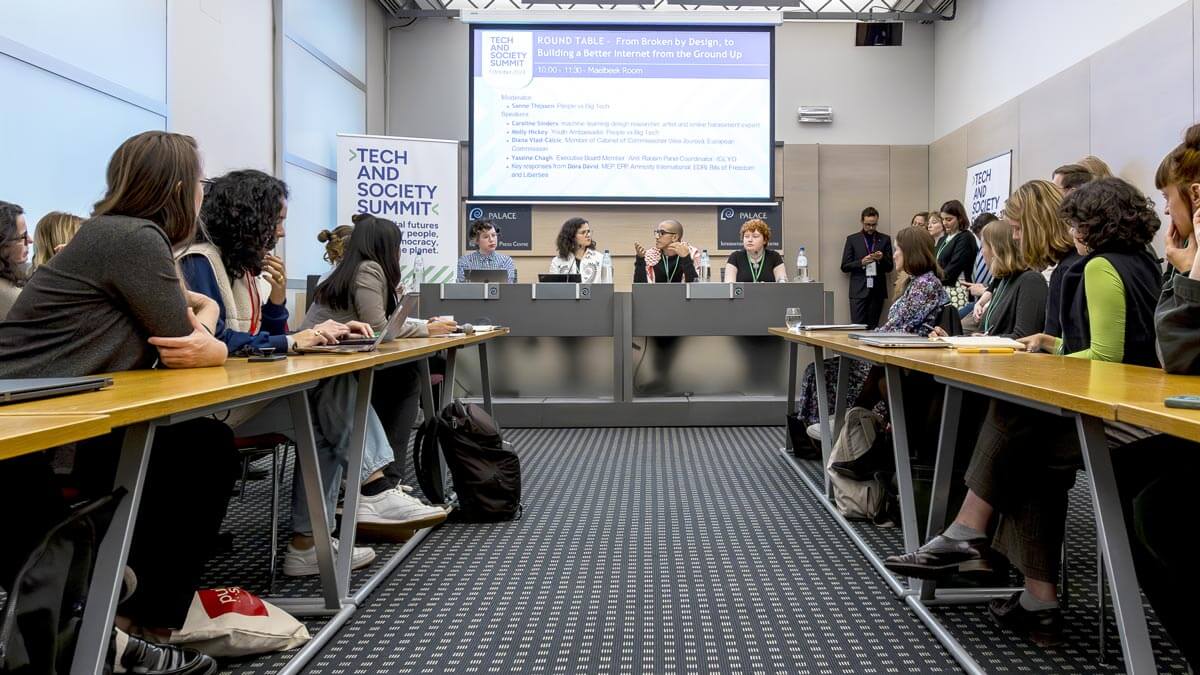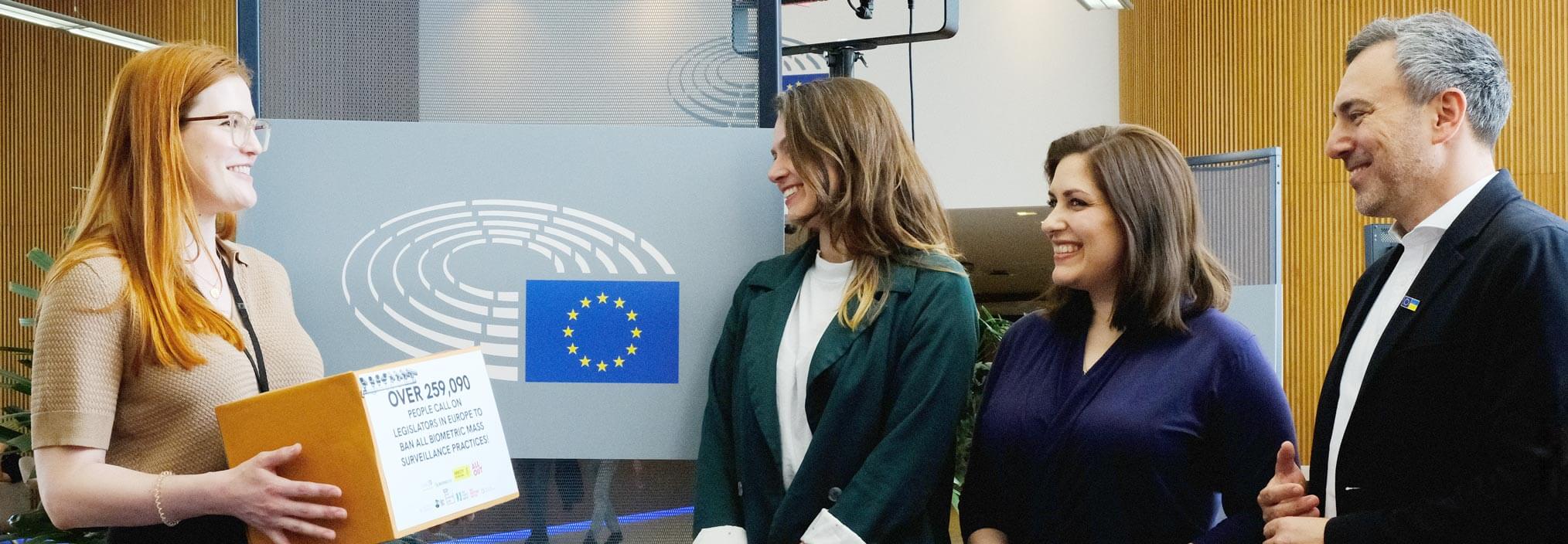European Digital Rights’ network of 50+ organizations and dozens of observers advance a safe digital landscape for people, democracy, and the planet.
After a routine traffic stop in February 2024, Serbian independent journalist Slaviša Milanov was brought to a police station. When he was released, Milanov noticed that his phone—which police had taken while he was in the station—appeared to have been hacked.
Milanov contacted Amnesty International’s Security Lab to analyze the device. The lab determined that his phone indeed had been compromised, and an unknown amount of data had been extracted from it. The analysis also found traces of spyware, illegal in Serbia, on the phone.
The incident is cited in an Amnesty International report, “A Digital Prison,” about Serbian authorities’ use of digital tools on civil society—a report that gained widespread exposure through European Digital Rights (EDRi).
Based in Brussels, EDRi is a network of more than 50 civil and human rights organizations, including Amnesty International, defending rights and freedoms online. It also acts as a watchdog, amplifying advocacy efforts and advancing important technology laws in the European Union (EU). Dozens of observers also contribute to the organization’s efforts.
EDRi is a network of more than 50 civil and human rights organizations, including Amnesty International, defending rights and freedoms online.
On the Serbian spyware issue, EDRi made its voice loud and clear.
“We urge the Serbian Government to adhere to its own legal framework and immediately cease the illegal use of NoviSpy and other spyware, which disproportionately interferes with fundamental rights,” European Digital Rights wrote in a December 2024 open letter to the EU.
Providing a broader platform for work such as “A Digital Prison” is part of EDRi’s mission. That includes:
- advocating for robust laws that are enforced;
- informing and mobilizing people;
- promoting a healthy, accountable technology market;
- and building a movement of organizations and individuals committed to digital rights and freedoms.
With a broad membership base that focuses on country-specific digital rights, EDRi works in four areas: advancing secure, safe digital networks; protecting citizens against undue state surveillance; ensuring the robust regulation of digital platforms; and helping the European Commission develop proper governance of artificial intelligence (AI).
“We believe that there should be a vision where technology services the public interest, answering what kind of vision we have of society.”
Beyond country-specific organizations, EDRi’s roster includes multinational organizations, such as the British international human rights group and MacArthur grantee Article 19, which includes digital rights in its mission to promote and defend freedom of expression and access to information. EDRi also gives a platform to digital rights organizations in nearby regions.
“We believe that there should be a vision where technology services the public interest, answering what kind of vision we have of society,” EDRi Executive Director Claire Fernandez said. “It is highly important for society to be able to come together and say, this is what a vision for public interest technology would look like from the perspective of those who are affected by technological harms.”
Building Momentum
EDRi’s member organizations demonstrated their unified presence in the network’s Tech & Society Summit in October 2024. A total of 41 civil society organizations attended the gathering, which provided a counterweight to industry voices.
That effort came after another milestone for EDRi: the European Commission’s 2022 Digital Services Act (DSA), landmark legislation in which EDRi leveraged its network to make sure civil protections were provided for Europeans online. Designed to regulate online intermediaries and platforms such as marketplaces, social networks, and content-sharing platforms, the DSA has established important protections and ground rules for online service providers. It insists they act against illegal and harmful content, better protect fundamental rights, and provide users with more control and choice.

EDRi Campaigns Officer Brian Donnelly, left, and Vladimir Prebili, Member of the European Parliament, were among the 41 civil society organizations attending the Tech & Society Summit in October 2024. Credit: Omar Havana
The DSA is rights-enhancing legislation that maintains online free speech and adds obligations for online platforms to address their harms, Fernandez said. EDRi’s role included “pushing for that narrative around the toxic and extractive business model of Big Tech,” Fernandez said, so the law identified the companies’ responsibility in preventing illegal content on their sites.
EDRi also contributed extensively to the 2022 Digital Markets Act, designed to prevent large tech companies and platforms from abusing their market power and to allow new players to enter the market. One of those abusive practices, self-preferencing, allows a search engine such as Google to prefer its own product over other companies’ offerings. EDRi made a specific point of campaigning against self-preferencing and similar tactics.
On AI, EDRi campaigned to make sure sufficient human rights safeguards were included in legislation that the European Commission is taking into consideration.
What we wanted to achieve with a large coalition of nonprofit groups was making sure that there are some limits to the most harmful uses of AI.
“What we wanted to achieve with a large coalition of nonprofit groups was making sure that there are some limits to the most harmful uses of AI, with this specific focus on uses around policing, migration control, and its use in the public sector,” Fernandez said. “We were partially successful in achieving some of these boundaries—with a huge exception: law enforcement and migration control.”
And while the EU has led the development of digital and AI-related protections for citizens, EDRi has been aware of the inadvertent consequences its leadership role can create, known as the “Brussels Effect,” in other countries.
The phrase refers to EDRi-supported legislation or recommendations that authoritarian states outside Europe adopt but then find loopholes to exploit—while maintaining that the measure is based on best European practices.
“There is a lot of risk associated with these effects,” Fernandez said. “When we as civil society are in the process of negotiating or adding our recommendations, we have to be really careful about the context in which these laws may or may not be reproduced.”
Leveraging the Network
In those and many other situations, EDRi must lean on its network.
“We make sure that we discuss potential legislation with civil society from other regions, to hear their concerns, to hear their context, and to understand what the legislation could mean in other parts of the world,” Fernandez said.

The Tech & Society Summit in October 2024 included several panel discussions and roundtables to bring attention to tech policy and promote accountability and the public interest. Credit: Omar Havana
EDRi’s network also enables it to monitor on-the-ground situations in various countries and to respond to challenges. In addition, the network’s members and partners give EDRi specialized experience in many issues with a digital rights component, such as migration, labor, education, and policing.
EDRi has helped organizations in its network access behind-the-scenes contacts and resources, said Dimitar Zagorski, EU Policy Director for Wikimedia Europe, an EDRi network member.
“Teaming up with EDRi we sometimes get meetings that individually wouldn’t be possible,” Zagorski said. He noted that the organization also helps broaden Wikimedia’s ability to monitor and respond to issues.
In addition, being part of the EDRi network allows many organizations to reduce their administrative and financial burden and focus on impact, Zagorski added.
“[EDRi’s] independence, intersectionality, and sustainability are all the more important to respond to concentration of power, exploitative structures, and digital threats.”
As AI becomes increasingly ubiquitous and influential, EDRi leaders expect surveillance issues to remain thorny and complicated, a scenario that requires the establishment of ground rules for preventing predictive policing abuses and government use of AI tools such as facial recognition for monitoring public interactions.
Incoming EDRi Executive Director Amber Sinha, who will succeed Fernandez said—among other plans—he will build on the seven years of tremendous growth Fernandez coordinated, resist surveillance initiatives, strengthen democratic accountability and participation, and work to counter threats posed by the concentration of power in tech.
“[EDRi’s] independence, intersectionality, and sustainability are all the more important to respond to concentration of power, exploitative structures, and digital threats,” he said. “With its extensive network of leading technology policy organizations across Europe, a seasoned team of experts in Brussels, and a cross-cutting theory of change, … EDRi is ideally placed to champion these issues in Europe.”
Since 2022, MacArthur has provided $1.02 million in support to European Digital Rights for general operating support and to host a 2024 summit for nonprofit tech stakeholders and European Union leadership.





